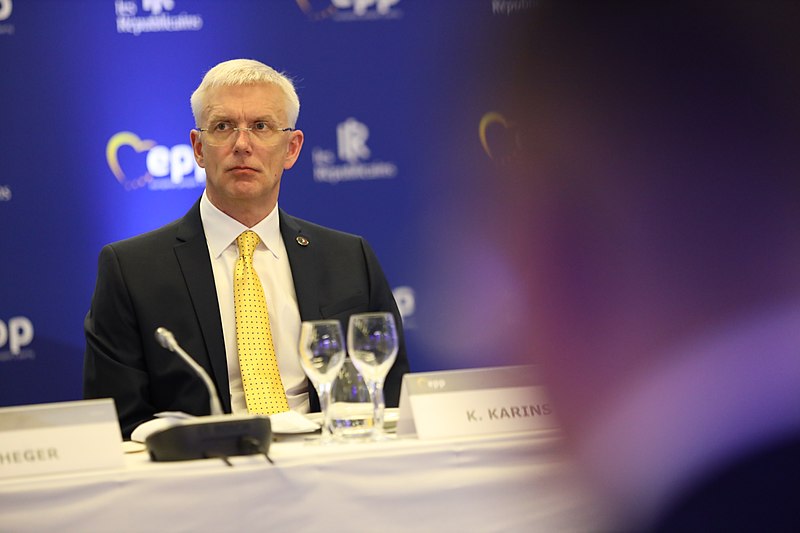Latvian Prime Minister Krisjanis Karins said traders are using Turkey, Armenia, and Kazakhstan to evade the EU sanctions imposed on Russia. Karins called for further cooperation in order to close the loopholes.
Following talks with the leaders of Estonia and Lithuania Friday last week, Karins said traders are using Turkey, Armenia, and Kazakhstan to legally trade goods while dodging the bloc’s sanctions on Russia. Karins cited a disproportionate increase in European trade within the three countries compared to the past.
“It seems quite clear that traders are finding ways to legally trade goods, say with Turkey, Kazakhstan, or Armenia which are then resent to Russia because these countries are not adhering to the sanctions regime,” Karins told reporters at Estonia’s capital Tallinn. Karins did not provide any further evidence of sanctions evasion and did not specify the kinds of goods that were allegedly being traded.
“One is to work with these countries, to get them on board also following the sanctions. The second is to look for legislation across Europe, to make sure that we criminalize sanction avoidance,” said Karins. “Close the loopholes!”
Turkey has condemned Russia’s invasion of Ukraine and has sent armed drones to Kyiv. However, Ankara has opposed the West’s sanctions on Russia and has close ties with both Russia and Ukraine. Turkey has also increased tourism and trade with Russia, and some Turkish companies have looked to buy Russian assets from Western partners, and others maintain large assets in Moscow.
Germany’s prosecutor-general said Berlin was able to collect evidence of war crimes committed in Ukraine and that there was a need for the judicial process at an international scale.
In an interview with the German Welt am Sontag newspaper published on Saturday, Peter Frank said Germany started collecting evidence of war crimes as early as March 2022, including interviewing Ukrainian refugees and assessing publicly available information. Frank noted, however, that Gerrman prosecutors have yet to interview certain individuals.
“Currently, for example, we are focusing on the mass killings in Bucha or attacks against Ukrainian civilian infrastructure,” said Frank, adding that prosecutors have so far found evidence in the “three-digit range.”
“We are preparing ourselves for a possible later court case – be it with us in Germany, be it with our foreign partners, be it before an international court,” said Frank.



 Missouri Judge Dismisses Lawsuit Challenging Starbucks’ Diversity and Inclusion Policies
Missouri Judge Dismisses Lawsuit Challenging Starbucks’ Diversity and Inclusion Policies  Trump Lifts 25% Tariff on Indian Goods in Strategic U.S.–India Trade and Energy Deal
Trump Lifts 25% Tariff on Indian Goods in Strategic U.S.–India Trade and Energy Deal  Trump Signs Executive Order Threatening 25% Tariffs on Countries Trading With Iran
Trump Signs Executive Order Threatening 25% Tariffs on Countries Trading With Iran  Jack Lang Resigns as Head of Arab World Institute Amid Epstein Controversy
Jack Lang Resigns as Head of Arab World Institute Amid Epstein Controversy  Trump Says “Very Good Talks” Underway on Russia-Ukraine War as Peace Efforts Continue
Trump Says “Very Good Talks” Underway on Russia-Ukraine War as Peace Efforts Continue  South Korea Assures U.S. on Trade Deal Commitments Amid Tariff Concerns
South Korea Assures U.S. on Trade Deal Commitments Amid Tariff Concerns  TrumpRx Website Launches to Offer Discounted Prescription Drugs for Cash-Paying Americans
TrumpRx Website Launches to Offer Discounted Prescription Drugs for Cash-Paying Americans  India–U.S. Interim Trade Pact Cuts Auto Tariffs but Leaves Tesla Out
India–U.S. Interim Trade Pact Cuts Auto Tariffs but Leaves Tesla Out  TrumpRx.gov Highlights GLP-1 Drug Discounts but Offers Limited Savings for Most Americans
TrumpRx.gov Highlights GLP-1 Drug Discounts but Offers Limited Savings for Most Americans  China Warns US Arms Sales to Taiwan Could Disrupt Trump’s Planned Visit
China Warns US Arms Sales to Taiwan Could Disrupt Trump’s Planned Visit  New York Legalizes Medical Aid in Dying for Terminally Ill Patients
New York Legalizes Medical Aid in Dying for Terminally Ill Patients  U.S. Announces Additional $6 Million in Humanitarian Aid to Cuba Amid Oil Sanctions and Fuel Shortages
U.S. Announces Additional $6 Million in Humanitarian Aid to Cuba Amid Oil Sanctions and Fuel Shortages  Iran–U.S. Nuclear Talks in Oman Face Major Hurdles Amid Rising Regional Tensions
Iran–U.S. Nuclear Talks in Oman Face Major Hurdles Amid Rising Regional Tensions  Trump Allows Commercial Fishing in Protected New England Waters
Trump Allows Commercial Fishing in Protected New England Waters  Trump Allegedly Sought Airport, Penn Station Renaming in Exchange for Hudson River Tunnel Funding
Trump Allegedly Sought Airport, Penn Station Renaming in Exchange for Hudson River Tunnel Funding  Japan Election 2026: Sanae Takaichi Poised for Landslide Win Despite Record Snowfall
Japan Election 2026: Sanae Takaichi Poised for Landslide Win Despite Record Snowfall  Ohio Man Indicted for Alleged Threat Against Vice President JD Vance, Faces Additional Federal Charges
Ohio Man Indicted for Alleged Threat Against Vice President JD Vance, Faces Additional Federal Charges 































